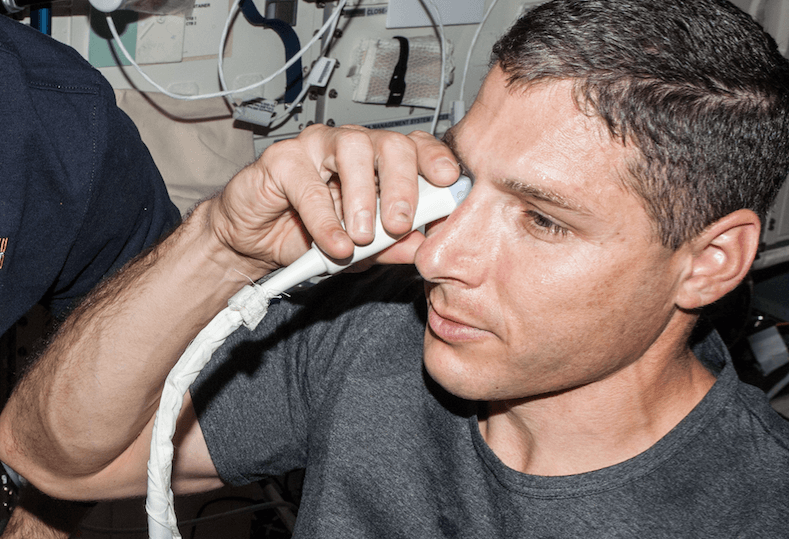Surprisingly to know, vision loss is known to be the number one risk of spaceflight. Some astronauts experience unexplained vision problems when they fly into space such as cloudy eyesight, or the need to suddenly have to wear glasses. Eye exams have also revealed that in some cases an unexplained swelling or flattening at the back of the eyeballs occurs. It is only in the last ten years that this issue has become apparent. Humans are now spending longer durations in space, and it’s this that seems to have an effect on some people’s eyesight.
In 2009, astronaut Robert Thirsk lived aboard the International Space Station for six months. During this time, he experienced some changes to his eyesight and when an ultrasound was performed it revealed that the backs of his and co-worker, Michael Barratt’s eyeballs had become flattened and pushed in. Thirsk’s sight then deteriorated further, and he became farsighted. This continued after he arrived home too. Although his vision has since slowly improved. A similar problem occurred for astronaut John Phillips too who stayed at the ISS for six months in 2005. His vision dropped from 20/20 to 20/100 during the mission, and although it has improved slightly, he still requires glasses today.
Because it is a relatively new problem that has only recently come to light, not much research has been done into why these vision problems happen and so far only theories exist. One such theory is that the gravity is pushing our fluids upwards causing pressure to be applied to the optic nerve and the back of the eye and therefore damaging the person’s eyesight. But, an even stranger theory has been developed by a team of scientists at NASA that speculates the reason these vision problems occur in some people and not others could be down to underlying conditions, particularly polycystic ovary syndrome (PCOS).
Although originally thought only to affect women, PCOS is now thought to affect men too, and many medical professionals agree that it is very badly named as only 80 percent of women with the syndrome have polycystic ovaries. Counter-arguments against this theory are that if PCOS is to be the underlying condition that causes eyesight problems in space, then why have no women reported any of the same issues? Scientists say this is because PCOS tends to affect women who are overweight or have an insulin resistance. Both of which are reasons they would not be allowed to travel in space as an astronaut and would fail the vigorous medical tests.
Clinical trials will soon be taking place at the Mayo Clinic to accelerate this research further. Researchers are looking to collect data on various groups including women with PCOS to compare it to as many astronauts as possible (both male and female). The team is hopeful that the results from the studies will enable humans to fly more safely in space.
More News To Read











